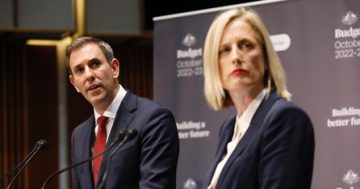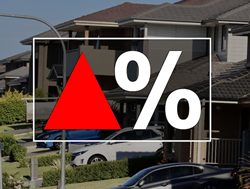Gareth Hutchens* says lessons from the past 40 years could show Australia the way out of the COVID-19 recession.
 Were you born in the past 40 years? Chances are you were — more than half of Australia’s population was.
Were you born in the past 40 years? Chances are you were — more than half of Australia’s population was.
If so, you’ve grown up in a world in which huge economic trends have been grinding away, influencing politics dramatically, which may make it difficult to escape this recession with the usual monetary and fiscal policies.
Let me explain.
Since the 1980s, politicians in advanced economies have pursued a policy framework that has failed large segments of their populations.
This applies to Australia, Canada, Finland, France, Germany, Italy, Japan, New Zealand, Norway, Portugal, Spain, Sweden, the United States, and the United Kingdom.
Over the past 40 years, for this group of countries, the average rate of economic growth has been slowing, investment to GDP ratios have fallen, business productivity has declined, and inflation has slowed noticeably, while the average real interest rate has dropped from 6 per cent to less than zero.
At the same time, household debt and government debt has exploded.
It has underwritten a huge transfer of wealth up the income distribution to the top 1 per cent.
The global financial crisis then amplified these trends, prompting some economists to ask if the global economy has been suffering “secular stagnation” in the past decade.
The word “secular” means long-term, in this context. “Stagnation” refers to an economy with little or no economic growth.
This conversation started in 2013 when Larry Summers, a former secretary of the US Treasury, wondered publicly why advanced economies had been struggling to grow since the GFC, and why inflation was so low, when interest rates were nearing zero and the world was awash in savings.
His question inspired burgeoning research on the topic.
And this year, a fascinating new paper from the field suggested two culprits were to blame for the phenomenon.
It said rising income inequality, and the liberalisation of the financial sector — both of which originated in the 1980s — had pulled those 14 advanced economies [listed above] into their current low-growth, low-interest rate, high-debt environment.
The paper was called Indebted Demand.
It was written by economics professors Atif Mian (from Princeton University), Ludwig Straub (Harvard University), and Amir Sufi (University of Chicago).
It could have implications for our current attempt to pull ourselves out of the coronavirus recession.
In a nutshell, the paper suggested the bottom 90 per cent of households in those 14 countries, and governments, had become so indebted in the past 40 years it had weighed on aggregate (total) demand.
At the same time, there has been a huge accumulation of income and wealth among the top 1 per cent, and since the super-rich have a greater propensity to save, interest rates have been falling.
Strikingly, the paper also warned popular expansionary policies — such as deficit spending and accommodative monetary policy — may make this current recession worse in the long run.
Why? Because when economies are already stuck in a low-growth, low-interest rate, high-debt “trap”, traditional methods of dealing with recessions can exacerbate the problem.
The paper argued debt-financed deficit spending may lift interest rates in the short-run, but demand will eventually be weighed down again when governments inevitably raise taxes or cut spending to service their even larger debt burdens.
Same with monetary policy.
Looser monetary policy may boost demand in the short run, but when the stimulus fades and the larger accumulated debts need to be serviced, demand will be dragged down again.
“Temporarily, deficit spending raises demand, bringing output closer to potential, or even above potential,” the paper argued.
“Eventually, however, as the public debt burden rises, along with the associated taxes to service it, demand falls again, and the economy finds itself back in the debt trap.
“To policymakers of the conventional view, running large deficits, the liquidity trap might thus indeed feel like a ‘trap’, pulling the economy back into the trap after every round of deficit spending.”
However, the paper also suggested conventional debt-financed deficit spending could still work in specific circumstances — if it didn’t add to the debt burden of the bottom 90 per cent.
Therefore, deficit spending must be financed “in a progressive way”.
“This requires taxing savers [the super-rich],” the paper argued.
“In reality, this could require raising top marginal income tax rates, better enforcement of estate taxes, or introduction of wealth taxes.”
The paper also argued unconventional policies may be required to pull advanced economies out of secular stagnation.
“Redistributive policies and structural changes to reduce income inequality are effective in sustainably generating more demand, and thus can prevent debt traps and effectively lead economies out of them,” the paper concluded.
Earlier this month, the host of the Jolly Swagman podcast, Joseph Walker, invited a former governor of the Reserve Bank of Australia, Ian Macfarlane, onto his show.
They spoke about the Indebted Demand paper.
“I like the paper,” Mr Macfarlane said. “I find it genuinely modern.”
“I’d classify them as younger economists, certainly younger than me, who are trying to make sense of how the world has developed over the last 40 years.
“I think they’ve made a big contribution already.”
Mr Macfarlane, who was RBA governor from 1996 to 2006, said he liked how they were “very technically orthodox economists” from institutions of “impeccable conventional excellence”.
“And they’re looking at things from an interesting perspective,” he said.
“They construct a model which … is inspired by the fact that they’re very conscious of the increase in inequality, and they’re very conscious of the increase in financialisation.
“I’m not surprised they’ve gone down this path … and I’m not surprised you’re interested in it,” he said to Walker.
“I think someone of your age, in fact anyone under 40, has basically spent all of their life in a world of falling inflation, falling interest rates, growing debt, rising house prices, increasing globalisation, and increasing labour-saving technical progress.
“So your view of the world should be very different from someone’s view of the world like [mine].
“And the economics profession should be reflecting that I think, and these guys are.”
Mr Walker asked Mr Macfarlane what he thought about the paper’s conclusion that huge reforms may be needed to overcome secular stagnation.
“The only policies that will get you out of this long-term secular stagnation are policies that address the widening inequality of income. That’s their conclusion,” Mr Macfarlane said.
“And that is actually quite a radical conclusion … but that’s the outcome of their model.
“What they would be talking about would be wealth taxes, higher marginal tax rates on very high incomes, inheritance taxes, things like that.
“And that may be the future.”
*Gareth Hutchens is a business and economics reporter.
This article first appeared at abc.net.au










